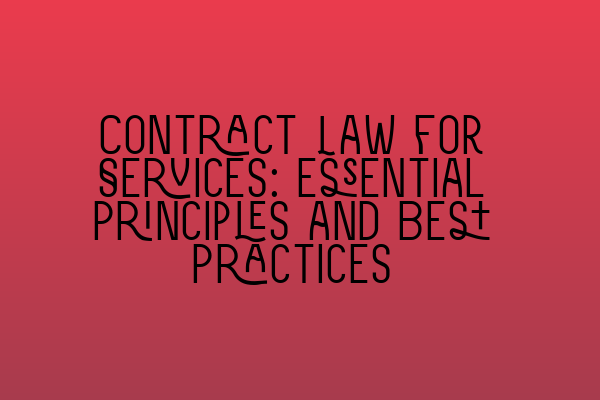Contract Law for Services: Essential Principles and Best Practices
Introduction
In the world of business, contracts are the foundation of legal agreements. They provide clarity and security for both parties involved in a transaction, acting as a roadmap for the provision of services. Understanding the essential principles and best practices of contract law for services is crucial for any professional seeking to navigate the complexities of business relationships. In this blog post, we will explore the key elements of contract law for services, offering valuable insights to help you protect your interests and ensure successful outcomes.
1. Offer and Acceptance
The first fundamental principle of contract law is the concept of offer and acceptance. An offer is a clear and definite expression of willingness to enter into a contract. It should include all essential terms and conditions, such as the scope of services, deadlines, and payment terms. Once an offer is made, it can be accepted, rejected, or countered by the other party. Acceptance occurs when there is an unconditional agreement to the terms of the offer.
2. Consideration
Consideration is a vital element of contract law. It refers to the exchange of something valuable between the parties involved. In the context of service contracts, consideration can take the form of money, goods, or other services. It is important for both parties to provide consideration to ensure a legally binding agreement. Without consideration, a contract may be deemed unenforceable.
3. Intention to Create Legal Relations
For a contract to be valid, the parties must have the intention to create legal relations. This means that they must confirm their willingness to be legally bound by the terms of the contract. In some cases, such as agreements between family members or friends, there may be a presumption that there is no intention to create legal relations. However, it is always advisable to clearly state the intention in writing to avoid any ambiguity.
4. Capacity
Capacity refers to the legal ability of an individual or organization to enter into a contract. In general, individuals must be of legal age and mentally competent to be considered capable of entering into a contract. Organizations must have the necessary authority, typically granted through the board of directors or other governing bodies, to bind the entity. It is crucial to ensure that all parties to a service contract have the requisite capacity.
5. Terms and Conditions
The terms and conditions of a service contract should be clear, complete, and unambiguous. They should cover all aspects of the agreement, including the scope of services, deliverables, timelines, payment terms, intellectual property rights, warranties, and dispute resolution mechanisms. It is important to carefully draft these terms and conditions to protect your interests and to avoid misunderstandings or disputes in the future.
6. Performance and Termination
Once a service contract is in effect, both parties are obligated to perform their respective duties. The contract should outline the expectations, quality standards, and deadlines for the provision of services. If either party fails to fulfill their obligations, the other party may have remedies available, such as termination, damages, or specific performance. It is essential to have clear provisions for termination in case of breach or non-performance.
7. Confidentiality and Non-Disclosure
Confidentiality and non-disclosure clauses are crucial in service contracts to protect sensitive information and trade secrets. These clauses prohibit the sharing of confidential information with third parties and often include confidentiality obligations that extend beyond the termination of the contract. Clearly defining the scope and duration of the confidentiality obligations is essential to safeguard your business interests.
8. Dispute Resolution
Disputes are an unfortunate reality in business relationships. Including a dispute resolution clause in your service contract can provide a structured process for resolving conflicts. This can include negotiation, mediation, or arbitration. By specifying the preferred method of dispute resolution, you can streamline the resolution process and avoid costly litigation.
Conclusion
Understanding the essential principles and best practices of contract law for services is vital for professionals in today’s business landscape. By paying attention to offer and acceptance, consideration, intention to create legal relations, capacity, terms and conditions, performance and termination, confidentiality and non-disclosure, and dispute resolution, you can ensure successful business relationships and protect your interests. Keep these principles in mind when drafting and negotiating service contracts, and don’t hesitate to seek professional legal advice when necessary.
For more resources on the SQE and contract law, check out these related articles:
– SQE 1 Practice Exam Questions
– SQE 1 Practice Mocks FLK1 FLK2
– SQE 2 Preparation Courses
– SQE 1 Preparation Courses
– SRA SQE Exam Dates
Remember, it is always prudent to consult with a qualified legal professional for specific advice on your individual situation. Contract law can be complex, and expert guidance can provide you with the necessary insight to navigate the intricacies of service contracts effectively.
